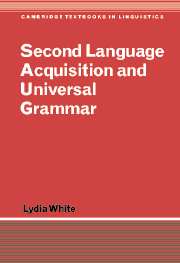Book contents
- Frontmatter
- Contents
- Preface
- Abbreviations
- 1 Universal Grammar and language acquisition
- 2 Principles of Universal Grammar in L2 acquisition
- 3 The initial state
- 4 Grammars beyond the initial state: parameters and functional categories
- 5 The transition problem, triggering and input
- 6 Morphological variability and the morphology/syntax interface
- 7 Argument structure
- 8 Ultimate attainment: the nature of the steady state
- Glossary
- Notes
- References
- Index
3 - The initial state
Published online by Cambridge University Press: 05 June 2012
- Frontmatter
- Contents
- Preface
- Abbreviations
- 1 Universal Grammar and language acquisition
- 2 Principles of Universal Grammar in L2 acquisition
- 3 The initial state
- 4 Grammars beyond the initial state: parameters and functional categories
- 5 The transition problem, triggering and input
- 6 Morphological variability and the morphology/syntax interface
- 7 Argument structure
- 8 Ultimate attainment: the nature of the steady state
- Glossary
- Notes
- References
- Index
Summary
What is the initial state?
In chapter 2, it was argued that there is a logical problem of L2 acquisition. Experimental evidence was reviewed which suggests that interlanguage grammars allow the representation of subtle and abstract distinctions whose source could not be the L1 grammar or the L2 input, hence must be UG. In other words, interlanguage representations are constrained by UG, conforming to principles such as the Overt Pronoun Constraint and the ECP. While some researchers have proposed that interlanguage grammars are ‘wild’, hence not fully UG-constrained, there are alternative analyses of the phenomena in question which can accommodate the potentially problematic data.
In this chapter, we turn to a different (though related) issue, namely the nature of the initial state in L2 acquisition. The term initial state is variously used to mean the kind of unconscious linguistic knowledge that the L2 learner starts out with in advance of the L2 input and/or to refer to characteristics of the earliest grammar. As Schwartz and Eubank (1996) point out, the interlanguage initial state was a neglected topic until the mid 1990s. In earlier work on UG in L2 acquisition, assumptions about the initial state were usually implicit. Even where they were explicit, the initial state was not the main focus of research. For example, White (1985b) proposed that L2 learners start out with L1 parameter settings.
Information
- Type
- Chapter
- Information
- Second Language Acquisition and Universal Grammar , pp. 58 - 99Publisher: Cambridge University PressPrint publication year: 2003
Accessibility standard: Unknown
Why this information is here
This section outlines the accessibility features of this content - including support for screen readers, full keyboard navigation and high-contrast display options. This may not be relevant for you.Accessibility Information
- 2
- Cited by
